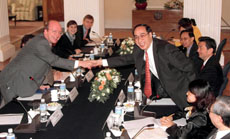 |
 |

The Sino-British Joint Liaison Group (JLG) concluded the 47th meeting in Hong Kong on December 8, thus bringing to a successful end of its historic mission. During the two-day meeting, the last of the group, representatives of both China and Britain reviewed the work of the JLG since its establishment in May 1985 and discussed matters of common concern as well as Hong Kong's future under the "one country, two systems" principle. The Sino-British JLG will be dismissed on January 1,2000 in accordance with the Joint Declaration between the two countries. Speaking at a media briefing after the meeting, Wu Hongbo, Chinese senior representative, said the JLG has accomplished its historic mission entrusted by the two governments. "The implementation of the Sino-British Joint Declaration is a challenging and unprecedented job. Many of the questions that the JLG handled have never cropped up in the field of the international law nor international practices. However we successfully resolved these questions through cooperation," he noted. Wu said China and Britain share the common interests of maintaining Hong Kong's long-term prosperity and stability on the basis of the Joint Declaration although they have different concepts of values and ways of handling issues. That's why both sides are able to cooperate with each other and solve one question after another and make due contribution to the smooth transition and transfer of power in Hong Kong, he noted. Wu pointed out that the "one country, two systems" principle is the key to the solution of the question of Hong Kong as well as to the insurance of its long-term prosperity and stability. The work of the Sino-British JLG has proved this point, post- handover Hong Kong has proved this point and Macao which will return to the motherland will further demonstrate this point, he said. Wu said facts in the past 15 years show that the determination of the Chinese side in implementing the Joint Declaration has remained unchanged and that its efforts in implementing the "one country, two systems" principle has never relaxed. "We have neither reason nor necessity to change this principle because the 'one country, two systems' is our fundamental state policy and component of China's reunification cause," he stressed. "The principle conforms to the fundamental interests of the Chinese people and the foreign investors in Hong Kong as well." Wu said, "We are delighted to see that the majority of Hong Kong residents and the Hong Kong SAR government have full self- confidence in administering Hong Kong well." Chief Executive Tung Chee Hwa and the SAR government are leading the Hong Kong people in carrying out the great practice of "the Hong Kong people administering Hong Kong," which is unprecedented historically, he said. Wu pointed out that the general situation of both countries must be taken into account in developing the Sino-British relations. "Years of work experience told us that progress and achievements can be made on the basis of taking into account bilateral relations," he said. "JLG's work has not only enhanced the mutual understanding and cooperation, but also paved the way for the further development of the Sino-British relations." Wu expressed the belief that the Sino-British relations will further progress after the successful visit of President Jiang Zemin to Britain. Alan Paul, British senior representative, said he is proud of the accomplishment of the historic mission. "I was encouraged by the smooth transition of July 1, 1997. And now two and a half years later, the overall picture is still a positive one," he said. "I remain optimistic about Hong Kong's future because I believe these traditional values and principles which include the rule of law and the independence of judiciary are deeply rooted here. "In the years to come, it is essential for the people and the institutions of Hong Kong to work together to ensure these remain the case," he said. |
Please visit People's Daily Online --- http://www.peopledaily.com.cn/english/